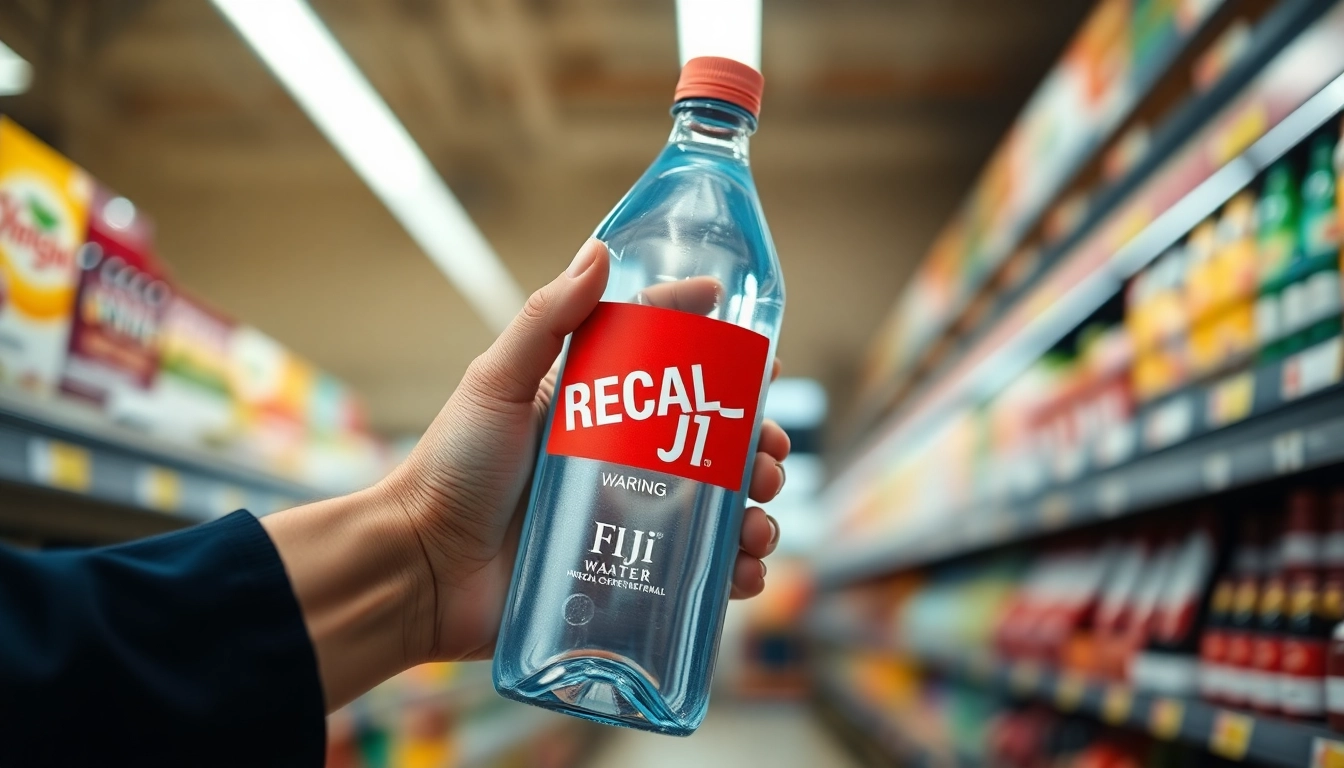Overview of the FDA Recall of Fiji Water
In May 2024, the U.S. Food and Drug Administration (FDA) announced a significant recall of Fiji Natural Artesian Water. This recall involved approximately 78,533 cases—equivalent to about 1.9 million bottles—that had been sold primarily through online platforms like Amazon. The impetus for this recall was the discovery of pathogenic bacteria and elevated levels of manganese, a mineral that can be harmful in excessive concentrations. It’s essential to comprehend the details surrounding this fda recalls fiji water for consumers, retailers, and health professionals, as it highlights critical issues related to food safety and public health.
What Happened
The recall was initiated after routine testing revealed that certain batches of Fiji Natural Artesian Water contained levels of manganese that exceeded regulatory limits and were potentially contaminated with three different types of bacteria. The testing process is part of the FDA’s ongoing surveillance of food and beverage products to ensure consumer safety. On May 23, 2024, the FDA formally announced the recall, prompting immediate action from retailers and distributors to remove the affected products from shelves.
Class III Designation Explained
This recall was classified as a Class III designation. Such classifications signify that the issues with the product are unlikely to cause any adverse health effects. However, it is essential to address all recalls seriously since even low-risk contaminants can lead to health complications, especially in vulnerable populations such as children, the elderly, or those with compromised immune systems. Understanding the implications of this classification helps consumers gauge the urgency and severity of the recall.
Significance of the Recall
The significance of this recall goes beyond the immediate concern of contaminated water. It serves as a critical reminder of the importance of food safety standards and regulations that govern bottled water and other consumer goods. The FDA’s actions also illuminate the broader context of environmental health, as the sustainable sourcing and processing of bottled water can have long-lasting impacts on consumer perception and trust in brands.
Understanding Contamination Risks
To fully understand the ramifications of the Fiji Water recall, one must examine the actual contaminants involved and their potential health risks. This section delves into what was found during testing and how such contaminants can affect human health.
What Contaminants Were Found?
Laboratory analysis revealed that the recalled water contained high levels of manganese, a mineral essential for human health in trace amounts but harmful when overconsumed. In addition, three different strains of bacteria were detected in the water, posing significant health risks. Consumers may not be immediately aware of the implications of such contaminants, making it crucial to raise awareness regarding these issues through education and outreach.
Health Risks Associated with Manganese and Bacteria
Excessive manganese exposure can lead to neurological issues akin to Parkinson’s disease, known as manganism. Symptoms may include tremors, muscle rigidity, and mood disturbances. Meanwhile, the bacteria found in this case can cause various health issues, ranging from gastrointestinal disturbances to severe infections in immunocompromised individuals. Hence, understanding the potential health implications emphasizes the importance of adhering to safety regulations in bottled water production.
How the FDA Handles Water Contamination Cases
The FDA follows a rigorous protocol when responding to contamination cases. This includes initiating investigations, testing samples, and working with manufacturers to promptly address any contamination issues. The FDA’s role is crucial in maintaining public trust by ensuring that companies follow established health safety standards and promptly inform the public about any risks associated with their products.
Consumer Reactions and Impact
During recalls, consumer sentiment and public perception can significantly influence brand reputation and sales performance. Fiji Water’s recall has prompted varied reactions from consumers and stakeholders alike.
Public Response to the Recall
Following the announcement, consumer reactions ranged from alarm to skepticism. Many longtime customers expressed disappointment, given that Fiji Water is marketed as a premium product. Social media platforms became inundated with opinions about the quality and safety of bottled water in general, raising questions about the entire bottled water industry and prompting a collective demand for higher standards.
Market Impact on Fiji Water Sales
The immediate impact of this recall on Fiji Water’s sales figures can be significant. Historical data suggests that similar recalls have caused substantial financial declines for brands, at least temporarily. Internal reports indicated a marked decrease in sales as retailers pulled the affected products and consumers became wary of the brand. However, recovery strategies, such as transparency in communication and addressing consumer concerns, can mitigate long-term damage.
Long-term Brand Reputation
Brands that experience recalls often face challenges in rebuilding trust with consumers. The long-term reputation of Fiji Water will depend significantly on how the company communicates its response to the recall, including measures they take to ensure product safety and prevent future occurrences. Open communication and effective risk management strategies are vital in restoring consumer confidence and maintaining market position.
Next Steps for Affected Consumers
If you think you may have purchased affected Fiji Water products, it is essential to know what actions you should take. This section provides a step-by-step guide on how to navigate the situation effectively.
How to Identify Recalled Products
The recall specifically targeted Fiji Natural Artesian Water 500 mL bottles sold in various retailers, notably Amazon. Consumers should check product labels for batch numbers and expiration dates that correspond with those outlined in the FDA’s recall announcement. The affected products’ details are usually listed on the FDA website to assist consumers in identifying if they possess a recalled item.
What to Do If You Have Recalled Fiji Water
If you have identified that you own the recalled Fiji Water, it is advisable to refrain from consuming the product. Return the water to the place of purchase for a refund or to discard it safely. Food safety authorities recommend following up with local health departments if you’ve experienced any adverse health effects after consumption.
Refund and Replacement Process
Fiji Water and major retailers, including Amazon, have initiated clear guidelines regarding refunds and replacements for the affected products. Consumers should retain their receipts and follow the specific procedures outlined by each retailer for returning or exchanging the product.
Preventative Measures and Consumer Advice
In light of the recent recall, it is crucial for consumers to adopt preventative measures to stay informed and ensure their safety regarding bottled water consumption.
Staying Informed About Food and Beverage Recalls
Consumers should pursue information about food and beverage recalls actively. Subscribing to FDA updates, following news outlets that report on food safety, and utilizing mobile apps designed to track recalls can help consumers stay informed about the safety status of products they commonly use.
What to Look for in Bottled Water Safety
When purchasing bottled water, consumers should examine labels for quality certifications, source information, and expiry dates. Familiarizing oneself with the brands and understanding their safety records can also provide insights into which products are safer choices. Additionally, awareness of local water quality reports can amplify consumer knowledge and safety.
Joining Consumer Advocacy Groups
Engaging with consumer advocacy groups can provide valuable resources and support in matters of food and beverage safety. These organizations often have information regarding recalls, consumer rights, and additional measures to ensure health and safety.



